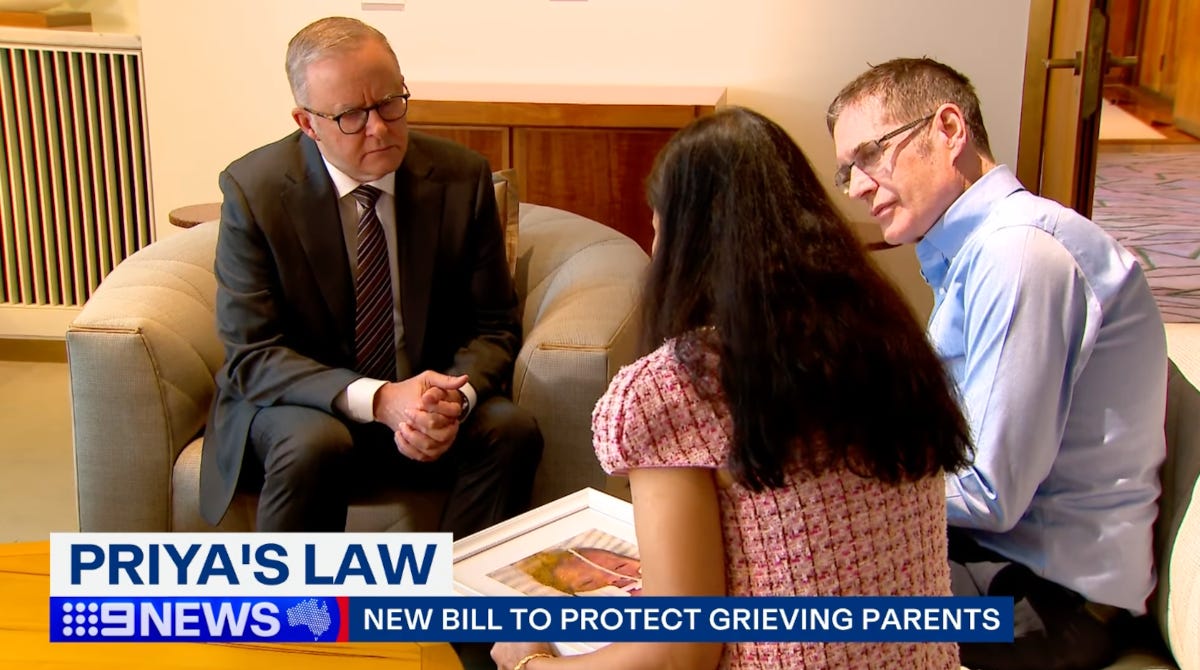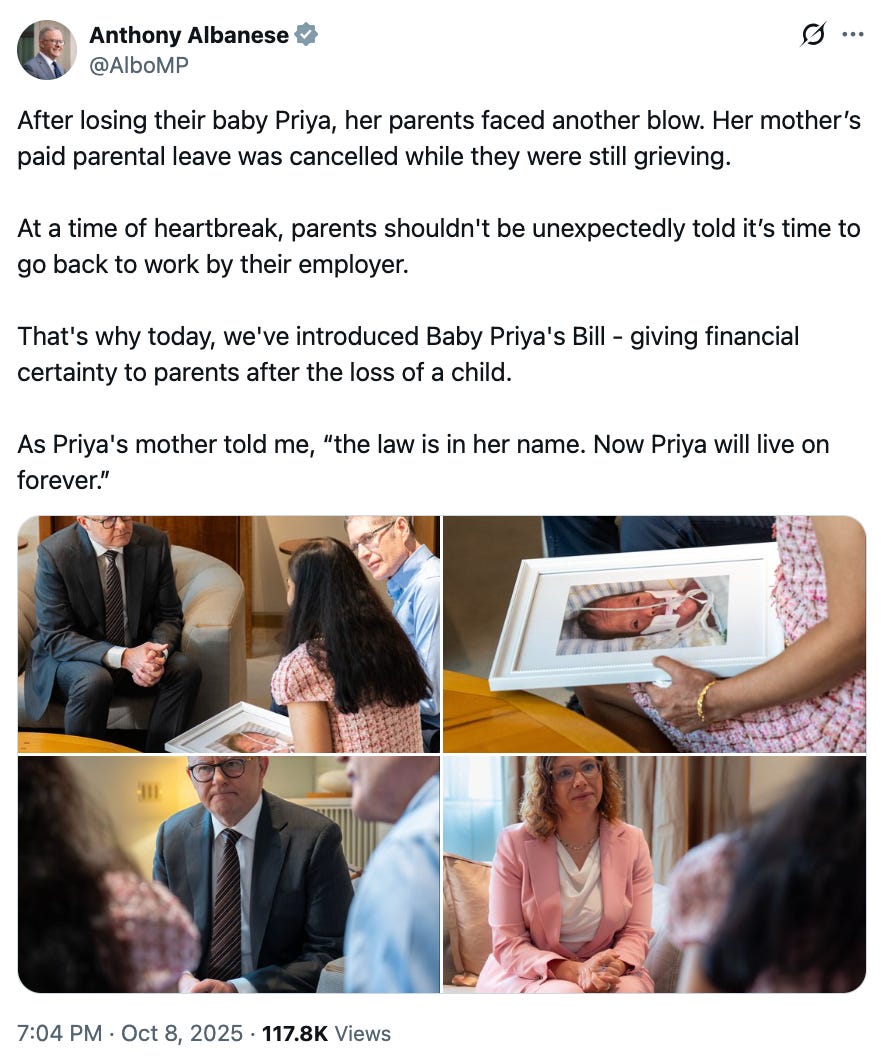Anti-abortion conservatives in Australia tried to turn a mother’s tragedy into a political game
Baby Priya’s Bill was about dignity for parents who suffered a devastating loss. Far right politicians claimed the bill would reward those who had abortions.
This newsletter is free and goes out to over 23,000 subscribers, but it’s only able to sustain itself due to the support I receive from a small percentage of regular readers. Would you please consider becoming one of those supporters? You can use the button below to subscribe or use my usual Patreon page!
In Australia, the Fair Work Act 2009 guaranteed that employees could get up to a year of unpaid parental leave after having a baby as well as a certain amount of paid leave. It was a perfectly sensible, pro-family piece of legislation.
In June of 2024, an Australian couple gave birth to a baby they named Priya. She was born prematurely—after only six months of pregnancy—so that law allowed her parents to spend quality time at home devoting their energy to Priya’s health.
But six weeks after birth, Priya suddenly died. It was an unexpected tragedy but at least the parents had time off from work to grieve and honor her memory, right? No. According to her mother, the company she had worked for for 11 years told her they were canceling her paid maternity leave because she was no longer a mother. They allowed her to have a month of personal time off, but that was less time than her child was even alive and certainly not enough to deal with everything she had just gone through. She had only weeks to recover, grieve, deliver the tragic news to family members and friends, cancel appointments, plan a funeral…
Her husband worked for the government, so he could get more time off, but the mother, who worked for a private company, was forced to go back to work early if she wanted to receive a paycheck and keep her job. It was utterly heartless… but also technically legal under the 2009 law.
The mother, who has remained anonymous, soon posted a petition online calling for the federal government to change the law so that companies couldn’t cancel maternity leave in the case of infant death or stillbirth.
Sadly this is legal and Fair Work Australia told me there was nothing they could do about the cancelling of my maternity leave. Legally employers can cancel paid maternity leave, even though they cannot cancel unpaid leave, in the event of infant death or still birth.
The law needs to change. My husband who is a teacher under the NSW industrial system got three months paid paternity leave, whilst I was back at work. This shows that different humane workplace laws are possible. These should be extended nationally to the federal industrial relations system.
We are calling on the Federal Australian government to make it illegal for employers to cancel paid maternity leave which had been approved, in the event of infant death or still birth.
The petition struck a nerve, gathering tens of thousands of signatures relatively quickly and spurring legislators to amend the 2009 law. It had overwhelming support from the different political parties as well.

And it worked. This week, “Baby Priya’s bill” finally passed through parliament, basically closing a loophole regarding employer provided leave. Without getting too bogged down in details, it says that parents dealing with a stillbirth or the death of a child can still access employer-funded paid parental leave. If an employer was going to give someone paid time off after the birth of a child, they can’t rescind it just because the baby is no longer alive. The bill makes sure what happened to Baby Priya’s mom won’t ever happen to anyone else.
Great news all around. So you might wonder: Who could possibly be against this?
Conservative men. Specifically members of the right-wing flank of the Liberal and National Parties who claimed that some pregnant women would take advantage of the bill by demanding to get paid after having late-term abortions. (Think of them as the Australian versions of Marjorie Taylor Greene, Lauren Boebert, and Mike Johnson.)
Liberal MP Andrew Hastie was among those worried about “unintended consequences”.
… “But I do call on the government, and I note the sensitivity around this, but I do call upon the government to clarify that it does not apply to late term abortions.”
Fellow Liberal MPs Henry Pike and Tony Pasin, as well as estranged Nationals backbencher Barnaby Joyce, also expressed their concerns.
Mr Pasin said paid parental leave “should be available to people who wish to be parents, but for the grace of God, have not become parents through that incident or outcome”.
“But it shouldn’t be available … to people who don’t wish to be parents,” he said.
Those remarks were overwhelmingly dismissed by politicians and citizens alike as a kind of “cynical… political exercise.” These men were acting like they didn’t know the difference between a stillbirth and an abortion. They acted like women would use this bill as a reward for having an abortion.
Health Minister Mark Butler called their comments “distressing”:
“It’s all the men on the right wing of the Liberal and the National Party and I just say to them: enough, just stop it. This is with about 3,000 families in our community that go through one of the most distressing events imaginable. We’re just trying to give them a bit of support. You know the definitions are clear. Just stop it.”
Priya’s mother was even more direct in her criticism: “Politicians like this should not be in parliament.”
To state the obvious, not everyone who has an abortion wants to have one. And when you’re terminating a pregnancy that close to birth, it’s almost always because of an unexpected situation—the mother’s health is in danger or the baby has a catastrophic health concern that wasn’t detectable earlier—not because the mother was lazy and forgot to have the procedure done months earlier, as these men seemed to be implying. No one is seriously getting pregnant, then having an abortion, just to mooch some paychecks from their employers. But these men insisted they knew what some women were secretly trying to do. (As is always the case with anti-abortion zealots, they have little compassion for and understanding of women who have to make that difficult choice.)
Health experts, whom those men never consulted, said something very different:
“Losing a baby after 20 weeks is losing a baby. We should treat anyone who loses a baby with compassion, instead of playing politics with people’s emotions and people’s distress,” said Dr Nisha Khot, the president of the Royal Australian and New Zealand College of Obstetricians and Gynaecologists.
As one commentator put it, these men twisted the intent of the bill because “outrage is easier than empathy, and performance is easier than policy.”
It wasn’t just men, though. There were a few conservative women who tried to amend the bill so that women who had abortions couldn’t receive any benefits from it. Thankfully, they failed.
[Alex] Antic, [Jacinta] Nampijinpa Price and [Sarah] Henderson voted for an unsuccessful One Nation amendment that would withhold paid parental leave in the case of an “intentional termination”; the Coalition’s Senate contingent backed [Matt] Canavan’s unsuccessful amendment to exempt intentional terminations except in the case where a termination was to protect the health of the mother. The bill eventually passed without amendment.
It was almost heartening to see how few allies they had in the government. It’s never a winning strategy when politicians from other countries try to mimic American Republicans and white evangelicals pastors.
Gemma Killen, director of the National Women’s Equality Portfolio at the Working with Women Alliance, wrote in a piece for The Guardian that the men who fought against the bill don’t actually give a shit about women in these situations because their actions never match up to their rhetoric:
Baby Priya’s mother is my hero. And the four conservative men that used her courage to start a fight about terminations are anything but.
…
If the politicians that suggested the bill would incentivise terminations really cared about reducing the number of babies who die in the perinatal period, they would be on the frontline, fundraising for stillbirth prevention research. They would make speeches about how the rate of stillbirth in Australia has not decreased in several decades and in fact increased in 2022. They would investigate the racism and inaccessibility in the maternity and medical systems that mean Aboriginal and Torres Strait Islander mothers are more likely to experience stillbirth.
The good news is that Baby Priya’s bill was ultimately passed without much opposition. But it did expose, in painful clarity, who is capable of empathy and who is not. The idea that anyone, much less a lawmaker entrusted with shaping public policy, could look at a grieving mother and see only a loophole to be exploited rather than a human being in need of compassion is grotesque. This law corrects a bureaucratic oversight that should have been fixed years ago.
These conservative men, and the few women who joined them, chose to weaponize grief for the sake of ideology. Instead of sympathizing with grieving parents, they reflexively treated those parents as if they have ulterior motives. They harbor the deeply disturbing view that, given the chance, some women will use abortion for personal gain. It’s the same misogyny we’ve come to expect from opponents of reproductive rights. They don’t give a damn about protecting life. They just want to police women.
That’s what makes this bill’s success so significant. It rebukes that brand of ignorance. It says that grief deserves dignity. It says, unmistakably, that Australia will not follow the path of religious zealots who treat their cruel faith as a moral principle.
It’s nice to see decency win out for a change.


I can't speak for Australia, but in the U.S., the pro-life crowd's concern for life is primarily directed at controlling women by any means necessary. They oppose universal healthcare, strict gun control laws, they are pro-death penalty and never met a war they didn't love. Their concern for the child ends at birth in most cases.
How many times have we said it: "The cruelty is the point." The ministers who opposed the Baby Priya's Bill demonstrate a marked dearth of compassion and empathy, and a clear desire to impose their ridiculously narrow point of view on all women, and particularly those of child-bearing age. Their inability to consider what is going on with a woman who has to deal with the emotional tumult of a miscarriage tells me that, as Priya's mother suggested, shouldn't be in parliament.
Indeed, they should count themselves lucky to be recognized in society at all.